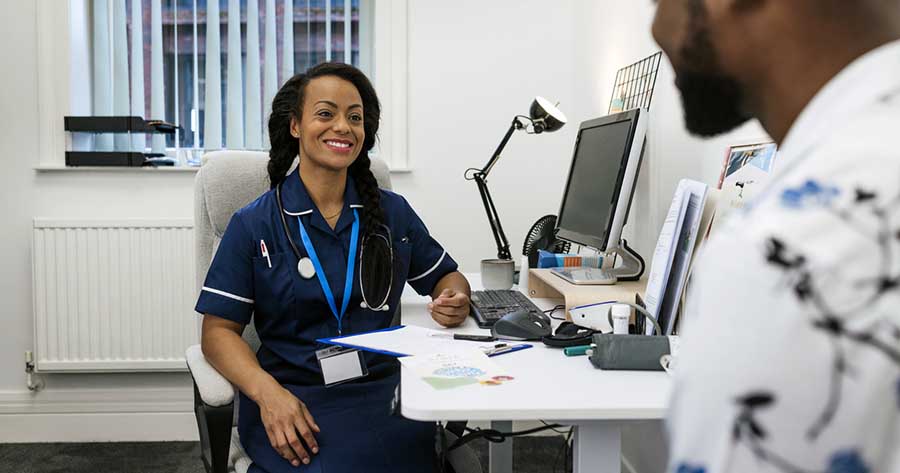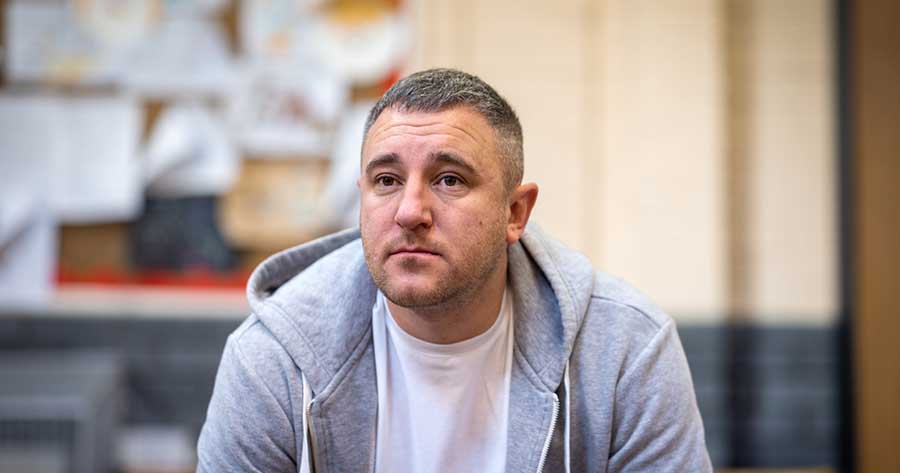The first nurse consultant in diabetes was appointed in Bolton in 2000. Currently, there are 11 nurse consultants in diabetes across the UK, with several other posts in the recruitment process.
Diabetes nursing: how did we get this far?
The importance of the role of nurses in managing diabetes has long been recognised. However, the formal establishment of DSN posts did not begin until the 1950s (Walker, 1953). In the UK, a specialist role for nurses in diabetes was first suggested by Dr Joan Walker from Leicester who suggested that all diabetic clinics should have a ‘field worker’ to provide education and after-care for people with diabetes (Walker, 1953). In keeping with the field worker approach, many of the original post holders came from district nursing or health visiting backgrounds.
The early 1980s witnessed a marked rise in clinical specialism in many areas of nursing. In diabetes the main impetus for this was the changeover to U100 insulin (from the earlier 40 and 80U/ml preparations. This was followed by the widespread introduction of home blood glucose monitoring and the growing trend towards starting insulin treatment in the patient’s home rather than in hospital. People needed education to make these changes safely and it became clear that nurses were ideally suited to provide this.
The contribution of the DSN to diabetes care is now undisputed. The role has become more complex and involves not only the initiation of insulin treatment and glycaemic control but also education of other healthcare professionals, management of hypertension and influencing policy making. The UK Audit Commission (2000) described the development of the DSN as a ‘critical landmark’ in diabetes care. The provision of adequate numbers of DSNs has become a major priority in many areas of the country.
Why do we need nurse consultants?
In the late 1990s, a widespread consultation exercise (aimed at developing a new strategy for nursing) revealed that limitations of the current career structure and ‘glass ceiling’ salaries was leading to experienced nurses leaving direct patient care for careers in management or teaching. This consultation also highlighted the new and innovative roles developed by nurses and that nurse-led initiatives resulted in improved services and quality of care (Health Service Circular, 1999). The challenge was to retain these experienced nurses in the clinical setting and the post of the nurse consultant was announced. By early 2000, six nurse consultants had been appointed nationally in specialities as diverse as learning difficulties, intensive care and public health.
The response from the nursing profession to the introduction of nurse consultants was divided, with enthusiasm and excitement from some whilst others cynically viewed it as a political gesture. However, nurses wanted to know what nurse consultants would do.
What do nurse consultants do?
It became clear that nurse consultants would have responsibilities in four main areas:
- Expert practice.
- Professional leadership and consultancy.
- Education and training.
- Practice and service development, research and evaluation.
This is a tall order for anyone. To guard against merely brushing the surface in an attempt to achieve all of this at once, it is important for the weight attributed to each of these areas to be dependent on local needs. The initial aim of the post was to keep experienced nurses in the clinical setting. Expert practice was therefore to form the bulk of the role, accounting for approximately 50% of working time. Several posts have been developed as joint appointments with academic institutions. These have a major focus on curriculum development and developing courses to meet local needs, with time allocated accordingly.
Who should apply for these posts?
Nurse consultants must be senior clinical nurses with expertise in their chosen field. Most posts specify at least 5 years experience. Applicants should have a ‘track record of scholarship’ including research, experience and publication and should be educated up to or beyond a masters degree.
The stringent application criteria may go some way to explaining why there have been so few applicants for nurse consultants posts in diabetes. This is a concern for the profession generally. Will supply meet demand? Are there enough experienced and suitably qualified nurses around to fill these posts? If not, will entry criteria be redefined or will unsuitable appointments be made just because applicants have the qualifications? In the case of diabetes, where does this leave the senior experienced DSN who has a portfolio of life long learning but does not have the academic credentials? To many, this may represent a shortfall of the process. However, it should be noted that the Health Service Circular (1999) clearly states that appointments will not be dependent on successful completion of a university or other course alone.
The application process
The process of establishing posts and making appointments is comprehensively covered in the Health Service Circular (1999). The Strategic Health Authority must approve all posts, so a lead person to drive the process forward needs to be identified. Posts are more likely to meet with approval if they are based around an unmet need and where success can be measured objectively. Linking in to national and local targets such as waiting times and the NSF for diabetes will strengthen the case.
Once a business plan has been developed, a provisional job description and plan should be devised and funding sought. There is no central funding for nurse consultant posts. Funding must be identified via ‘new monies’ and must not be merely an upgrading of a current post. In reality this has not always been the case. Several nurses working in a variety of specialities have applied openly for an upgrade of their original post. A submission to the Strategic Health Authority will only be considered once funding has been secured. Strategic Health Authorities meet on a regular basis to consider applications but the process can be lengthy.
Once approval has been gained, posts must be nationally advertised to ensure fair and open competition. Interview panels usually consist of the director of nursing services, the clinical lead from the speciality, a representative from an academic institution and representation from primary and secondary care. The selection process is rigorous and interview preparation is outlined elsewhere (Pennington, 2000). Disappointingly, in the case of diabetes, most posts have attracted only one or two applicants.
The title ‘nurse consultant’
Interestingly, one of the most contentious issues around the introduction of the post has been the title. Is consultant the most appropriate title? The concept of consultancy in nursing is not new and has been used to describe elements of the role in psychiatry and practice development (Coyne, 1996; Wright, 1998). In addition, the term is used by many different occupations, often to describe an individual in a senior position with specific skills or knowledge, e.g. ‘accounts consultant’ and more recently ‘image consultants’. Many hairdressers now offer colour consultancy to help clients choose the most appropriate hair colour! A consultant may be defined as ‘a person one seeks out for advice, expertise, counselling or specialist input to a problem’ (Castledine, 1998). This definition comprehensively describes the activities of a senior nurse working at this level of practice providing all of these things, at a variety of times, to both patients and colleagues.
Today an abundance of nursing titles exist that describe nurses working in diabetes care (e.g. clinical nurse specialist, senior diabetes nurse and diabetes nurse facilitator). Many of these titles are decided locally, often according to the financial resources available and the title may not reflect the key elements of the role. This can cause confusion for patients and staff alike. To avoid repeating mistakes from the past it is important for new posts to have a distinct title, which should only be used by those individuals appointed to approved posts. The title ‘consultant’ appears to be a fair option.
The national picture
National data is currently sparse. However, correspondence in March 2003 with the assistant chief nursing officer reveals that over 800 posts have now been approved and about 500 have been appointed. However, some specialities have had difficulty recruiting.
What is happening in diabetes?
There are currently 11 nurse consultants in diabetes in post across the UK (March 2003). The North-South split is about even with two posts in London; two in West Sussex (Chichester and Worthing); one in Portsmouth; one in Birmingham; one in Leicester; three in the North West (Liverpool, Bolton and Knowsley); and one in Bradford. A further two posts in London have been advertised but have failed to attract suitable applicants. One post in the Midlands initially recruited, but the post holder moved on after a short time. Several more posts are in the recruitment phase.
The characteristics of the post holders are shown in Table 1: all have either a first degree, a masters degree or are working towards a masters degree. In addition, three of the nurse consultants are currently registered for a PhD. As may have been expected, eight are employed as nurse consultants in the same trust which they were employed in as specialist nurses.
The focus of the role very much depends on the needs of the service. About 50% of nurse consultants in diabetes have been employed specifically to move diabetes care out into primary care and are focusing on developing services and skills in primary care. In line with the NSF, patient education is another major focus. Other nurse consultants are focused more on secondary care, concentrating on specific patient groups such as pregnant women with diabetes, nephropathy, type 1 diabetes and inpatients. All have a remit for diabetes care across both primary and secondary care. The driving forces behind securing approval and funding for posts include directors of nursing, consultant physicians, a PCT chief executive and the nurses themselves. Most report being very satisfied with the role despite initial hurdles such as lack of secretarial support.
Personal experience
The main focus of my role is to influence inpatient diabetes and to help implement the NSF across primary and secondary care.
An audit of the workload of the diabetes liaison nurse indicated a need for education, care pathways and clinical guidelines for non-specialist staff, particularly in areas such as casualty, cardiology and the medical assessment unit. Education was aimed at raising awareness of the service, avoiding unnecessary admissions and aiding early discharge. The need to improve the quality of care during hospital admission features prominently in the NSF standards document (Department of Health, 2001).
I have three clinics a week in the diabetes centre: one new patient clinic and two clinics that focus on high risk people with type 1 diabetes (those with risk factors for the development of complications, recurrent diabetic ketoacidosis and other endocrine conditions). The diabetes liaison nurse now also runs a clinic alongside mine, following up people recently discharged from hospital. I am continuing to work in a more strategic manner with primary care (across three PCTs) to develop primary care services and implement the NSF. I am now an honorary lecturer at the University of Liverpool, a research mentor and deputy audit lead for the directorate.
My clinical leadership role has expanded beyond the diabetes nursing team, throughout the trust and across the PCTs. Key elements of my role are shown in Table 2.
Nurse consultants and specialist nurses: what are the differences?
I have now been in post for 8 months (having previously spent 14 years as a DSN) and the role is still developing. The key differences for me so far are:
- Fewer management responsibilities. I still have two people (a diabetes liaison nurse and a specialist nurse co-ordinator) who report to me but I do not have the daily responsibility of managing the diabetes nursing service.
- Less clinical work. Currently about 40% of my time is taken up with clinical work, but as the service develops this will increase. In my previous role clinical work occupied about 80% of my time.
- More strategic and political work.
- Protected time to develop audit and research.
- An opportunity to focus on a specific patient group (inpatients and people with high-risk type 1 diabetes)
- The salary!
Where does the nurse consultant fit in to the nursing team?
The focus of the role of the nurse consultant should be leadership rather than daily management. Letting go of the management role may be initially difficult but is necessary. In our centre we work in three ‘consultant attached’ teams. Each team consists of a DSN who is supported by a nurse educator. One of the specialist nurses also acts as a co-ordinator, managing the team as a whole on a daily basis. Currently, this is done on a rotational basis to allow all the specialist nurses to gain this valuable experience but this may change in the future. Each specialist nurse has responsibility for appraising the nurse educator and setting individual team goals. The nurse consultant has responsibility for providing leadership, direction and goal setting for the nursing team as a whole and appraising the liaison nurse and the specialist nurses. So far this has worked well with a few minor problems.
The role of the specialist nurse and consultant nurse have much in common and overlap is inevitable. The challenge is to ensure that the roles are complementary. The consultant nurse is another member of the diabetes team who works in a more strategic manner, for the best interest of the person with diabetes.
Does your service need a nurse consultant?
If the role of the diabetes nurse consultant is to succeed it is important to get the fundamentals right from the start. This should help avoid confusion and role conflict. There are a number of issues it is useful to consider:
- Review the needs of the service: what have you got? what do you need? who is the most appropriate person to influence this unmet need? Seek out the views of the major stakeholders. If your major problem is dietetics perhaps a consultant dietitian is who you need.
- Consider the skill mix: who is doing what? Could your unmet need be addressed by redefining roles within your current service?
If you decide that you need a nurse consultant:
- Define some clear objectives of the role. There needs to be a degree of flexibility to allow the post holder to develop the post.
- Develop a new job description. This may involve reviewing the job descriptions of other members of the diabetes team. Consider how this will affect others and promote it in a positive manner. Encourage members of the team to articulate their own areas of interest and expectations of the nurse consultant position. There is likely to be some redefining of roles and this may lead to initial uncertainty.
- Consider how this new role will have a knock on effect on other services, e.g. dietetic referrals.
- Create a supportive environment for all members of the team.
See Table 3 for a concise list of issues to consider when deciding if your service needs a nurse consultant.
Conclusion
The introduction of the nurse consultant represents a huge opportunity for nursing. The role is new and evolving and we have a responsibility to make it work. Junior nurses now have something to aspire to and senior nurses who have reached the glass ceiling will welcome the challenge. The differences will be what we make them.




In her final editorial, Su Down reflects on her career and the remarkable progress in diabetes care she has seen.
11 Dec 2025